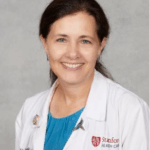
News in Brief, June 2024
June 11, 2024
Heather Wakelee Honored with ECOG-ACRIN’s Remarkable Mentor to Women in Oncology Award
June 11, 2024Trial Results: ECOG-ACRIN Research Round-Up – ASCO 2024 Highlights

Below are summaries of five ECOG-ACRIN Cancer Research Group (ECOG-ACRIN) trials presented by researchers at the 2024 American Society of Clinical Oncology (ASCO) Annual Meeting, held in Chicago and online from May 31 to June 4, 2024. These trials were funded by the National Cancer Institute, part of the National Institutes of Health. Click on the links to access the meeting abstracts and hear the lead investigators describe the relevance of these findings for clinical practice.
Breast Cancer – Black patients with early-stage breast cancer who were treated with docetaxel chemotherapy every 3 weeks had less drug-induced peripheral neuropathy and significantly fewer dose reductions compared to those who received weekly paclitaxel, according to the results of EAZ171, a randomized phase 2 study. It is the first National Cancer Institute (NCI)-sponsored trial to focus specifically on enrolling a minority or underserved population to assess drug-induced toxicity (rather than drug efficacy) where there are known disparate outcomes. Lead investigator Tarah J. Ballinger, MD (Indiana University) discussed the study with Reshma Jagsi, MD, for The ASCO Post Newsreels.
The Journal of Clinical Oncology simultaneously published the EAZ171 results. Lead author Brian P. Schneider, MD (Indiana University), spoke with host Dr. Shannon Westin, who featured the manuscript on the ASCO JCO Podcast.
Esophageal/Gastric Cancer – There is no benefit from adding the immune checkpoint inhibitor nivolumab to neoadjuvant carboplatin, paclitaxel, and radiation for patients with locoregional esophageal and gastroesophageal junction adenocarcinoma, according to the results of study EA2174. “Unfortunately, we had a negative outcome. But at least we know that now and hopefully, we can continue to move forward and find other ways to improve the treatment outcomes for these patients,” said lead investigator Jennifer R. Eads, MD (University of Pennsylvania), in an interview with the American Journal of Managed Care (AJMC).
Head and Neck Cancer – E3311 was a practice-changing clinical trial with primary results showing that low-dose radiation at 50 Gy without chemotherapy following transoral surgery (TOS) led to very high survival and outstanding quality of life in patients with human papillomavirus-positive (HPV+) throat cancer and at medium risk for recurrence. Now, long-term follow-up results are available. ”This de-intensified approach led to a 54-month progression-free survival of 90% and an overall survival of above 90%. Late recurrence is not increased when post-operative radiation is reduced from 60 to 50Gy for intermediate-risk patients,” said lead investigator Barbara A. Burtness, MD (Yale University), in an interview with eCancer.
Pancreatic Cancer – Overall survival and toxicity rates were similar between two front-line treatments in a trial of elderly patients (70-90 years old) with metastatic pancreatic cancer, according to the results of the GIANT trial (EA2186). The researchers developed a new clinical tool to assess patients better, and this resource is now available for other elderly-specific clinical trials regardless of cancer type. The trial results provide important data to guide treatment decisions and goals of care discussions in this vulnerable patient population. “The reason for this trial is really the fact that we just don’t know how to take care of these patients because the data that we have is on much younger patients,” said Efrat E. Dotan, MD (Fox Chase Cancer Center), in an interview with The ASCO Post Newsreels.
Prostate Cancer – Median progression-free survival was five months longer with cabazitaxel with abiraterone compared to abiraterone alone in patients with metastatic castration-resistant prostate cancer who were previously treated with ADT + docetaxel chemotherapy, according to the results of the CHAARTED2 trial (EA8153). Lead investigator Christos P. Kyriakopoulos, MD (University of Wisconsin) highlighted the key data takeaways and how clinicians should interpret the benefits of combining these therapies, especially when considering treatment-related adverse events, in an interview with Vadim Koshkin, MD of GU Oncology Now.
View the complete list of ECOG-ACRIN abstracts at ASCO 2024.
![ECOG-ACRIN logo[19516]275×75](https://blog-ecog-acrin.org/wp-content/uploads/2021/03/ECOG-ACRIN-logo19516275x75.png)
